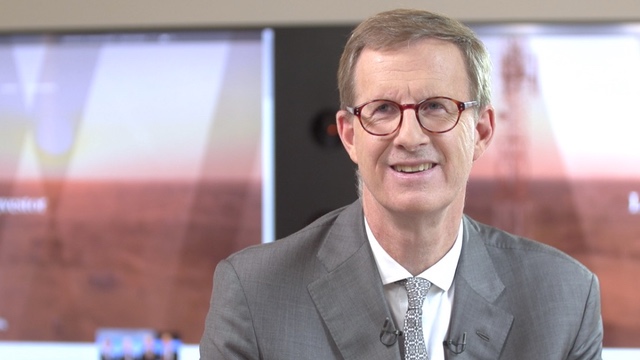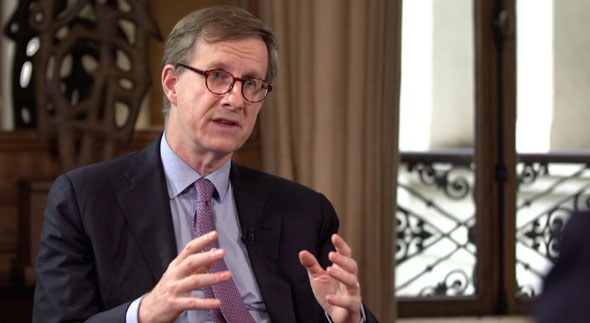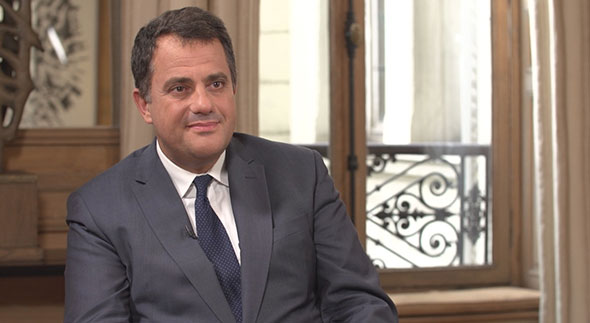EuroBusinessMedia (EBM): Wendel Investissement, one of Europe's largest listed private equity firms, is holding its annual general meeting. Jean-Bernard Lafonta, welcome. You are the CEO of Wendel Investissement, and this is your fifth AGM since you became Chief Executive. Looking back on the past five years - which is the standard holding period for private equity investments - what is your update for shareholders on where your company was and where it stands today?
Jean-Bernard Lafonta (JBL): I will say that makes five years that time has gone very quickly, but we have done a lot of work during that period of time. Mainly we changed Wendel from a holding company to an investment company. We made very significant investments in world leaders, we are in control almost everywhere of the companies in which we are present, and we are today one of the most important European investment companies, and - more importantly - we have the best performance today. Of course over this period of time we have had a very impressive increase in the stock price - +50% per year - but I think that the most important thing is that we created a model which makes sense today in the world in which we are.
EBM: When you arrived five years ago you initiated a simplification of the structure of the company. Today, you are announcing phase 2 of this simplification. What does that entail exactly?
JBL: I think that we are now in the position to achieve the simplification we began five years ago. Five years ago the target was to merge two public companies to create Wendel and increase the liquidity in the market. The success of that was important. Today we have 45,000 individual shareholders when five years ago we had just over 30,000. We have liquidity which is above 100,000 shares per day whereas we were below 20,000 five years ago. So we have achieved a lot of our targets, and now the only purpose is to achieve the simplification by cancelling a loop we have in Wendel Participation shares, and also in Wendel shares. And the main result of that will be an increase of the free float of Wendel from 54% to 59%, which should contribute also to liquidity, and we will have also the management having some debt to become significant shareholders of Wendel with 4.7% of the capital which is I think a good thing.
EBM: You are also announcing today that the company will now simply be named 'Wendel'. Why the name change, and what does it tell us about the company's brand positioning?
JBL: I think that today everybody knows what Wendel is doing. They know that we are an investment company, and we just take that into account and say O.K., we come to the name Wendel, which everybody in the market is already using.
EBM: You recently opened an office in Singapore and hired away a top manager from Axa, Philippe Donnet, in an effort to build up your international presence. What can you tell us about the forthcoming internationalization of your company and its investment portfolio?
JBL: We have a model at Wendel which can be duplicated, and we began that internationalization last year with the acquisition of Deutsch in the U.S., Stahl and AVR in the Netherlands, and we came to the conclusion that it was possible for Wendel to leverage the competitive advantages we also have in that market. So now we are just going to build what we need to be present first in European markets, in the Netherlands, perhaps in Germany. We will hire talented people we need to be able to penetrate those markets, and we think also about Asia - which is not yet a very significant market compared to Europe or the U.S., but will surely become so. And we hired a manager, Philippe Donnet, who is well-known in Japan where he was able to turn Axa around. He was responsible for Axa in the Asia-Pacific region. We think he will be able to build something for us in the upcoming five to ten years. Some countries there are particularly appropriate to Wendel's profile, because they give a lot of importance to a long-term and industrial approach. So we think this will be successful a few years from now.
EBM: If Bureau Veritas goes public, that means 80% of your net asset value will be publicly traded, which would be a frank departure from the private equity pure player business model. What are your comments on this paradigm shift?
JBL: I think that the main change we had over the last five years was to go from a holding company to an investment company. We came from noncontrolling our portfolio to a control of the companies in which we are. When we bring Legrand to the market, Legrand is public, but the potential of Legrand is not smaller than it was when it was private, and the control of Legrand we have is a real control, just as when it was private. So this is the main change, not from public to private, but from noncontrol to control. Then the question is: when you are in public companies, what is the interest of being in Wendel? And we think that Wendel demonstrated over the last five years its ability to create value by itself. When you look at the value which was created by the management team of Wendel, we estimate that out of the +35% of net asset value increase we had over the past year, one-third came from the decision we took as a management team. And we think that it has some value for our shareholders, so I think this is the answer to the question.
EBM: You claim that Wendel has a specific know-how and business model which enables you to deliver higher returns than classic private equity funds. What are the specifics of this know-how and business model?
JBL: We are one of the most important investment companies in Europe, so that means that the number of competitors we have is something like 15 - no more. And all of them are shorter-term than we are. So we are different. And being different in that market has a lot of value because you can decide to select the companies for which being longer-term creates a competitive advantage. Because they offer more ROEs, more external growth, and you can decide to invest in that to create value because you have the time. So I think that the over-performance of Wendel comes from this competitive position and it should last.
EBM: Finally, looking ahead, if some possible disposals are made in the portfolio, you will have a significant amount of cash to reinvest. What can you tell us about the next investments that you are likely to contemplate in terms of size, calendar, sectors and geography?
JBL: I think that first of all it is important to keep in mind the fact that we have no specific pressure to invest because we have structurally in our balance sheet a debt, bond debt, and so when we have more cash in front of debt we don't decrease the return forward we are able to generate. We just have a cost of debt which is very close to the cost of cash. Having said that, of course our objective in the coming years is to invest significant amounts. We want to double the net asset value of Wendel over the next five years, and we think that in order to do that we will have to invest something like 3 billion euros of equity over the coming years. But we are under no pressure to do that quickly. So we will be very selective, try to attract the best assets, and matching with the intrinsic quality of Wendel which is being able to be long-term and oriented towards project and value creation.
EBM: Jean-Bernard Lafonta, CEO of Wendel, thank you very much.
JBL: Thank you.





